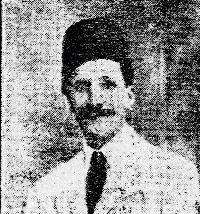Abd al-Hosayn Ayati
Abd al Ḥosayn Ayati (1871—1953) was a Baha'i missionary, journalist, author and teacher. After conversion to the Baha'i Faith, he spent 18 years as missionary and was a close companion of ʻAbdu'l-Bahá, who conferred on him the titles of "Raʾīs-al-moballeḡīn" (Chief of Missionaries) and "Avarih" (Wanderer).

He later became a Muslim and an opponent of the Baha'i Faith, being considered a Covenant-breaker. He returned to Tehran and spent the rest of his life as a secondary school teacher. During this period he wrote many works of poetry and prose, including Kashf al-Hial, a three volume work refuting the Baháʼí Faith.[1] He was labelled by Shoghi Effendi as a "shameless apostate".[2]
The numerous references made to Avarih in John Esslemont's book Baháʼu'lláh and the New Era were removed in subsequent editions published after Avarih's apostasy from the Baha'i Faith.[3]
Works
_1.gif)
- Al-Kawākeb al-dorrīya fī maʾāṯer al-bahāʾīya: a major work on history of Baha'i Faith.[1]
- Kašf al-ḥīal: his work in three volumes after conversion from Baha'i Faith.[1] Vol. 1, Vol. 2, vol. 3.
References
- Afshar 2011.
- Maxwell, Ruhiyyih (Mary Khanum) (1969). The Priceless Pearl. London: Baha'i Publishing Trust. p. 120.
- Salisbury, Vance (1997). "A Critical Examination of 20th-Century Baha'i Literature". Baháʼí Library Online. Retrieved December 8, 2016.
- Afshar, Iraj (August 18, 2011). "ĀYATĪ, ʿABD-AL-ḤOSAYN". Encyclopædia Iranica.